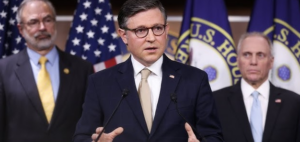Congressional leaders have unveiled a large spending bill to fund the government through mid-March and provide substantial aid for disaster relief. However, some House Republicans are resisting due to the bill's extensive scope and inclusion of various policies.
Congressional Leaders Propose $100 Billion Spending Bill Amid Disaster Relief Needs

Congressional Leaders Propose $100 Billion Spending Bill Amid Disaster Relief Needs
A sweeping spending bill aims to address disaster aid and maintain government funding, but faces pushback from House Republicans over its complexity.
Congressional leaders have announced a significant piece of legislation aimed at averting a government shutdown while also delivering much-needed disaster aid. The $100 billion spending bill, unveiled Tuesday, is designed to sustain government operations through the middle of March, while allocating nearly $100 billion for communities devastated by recent hurricanes and other disasters.
In an effort to address the looming Friday deadline to prevent a government shutdown, lawmakers from both parties have been working diligently to craft a deal. This massive bill spans over 1,500 pages and notably provides $10 billion in direct economic assistance for farmers, alongside another $21 billion designated for disaster relief in agricultural sectors. Despite its intentions, many expect that Speaker Mike Johnson will encounter significant opposition from within his party—particularly from mainstream conservatives who are expressing concerns over the bill's extensive nature.
During his address to fellow lawmakers, Speaker Johnson argued the necessity of the proposed legislation, citing his responsibility to respond to “acts of God,” which he referenced in light of the severe hurricanes impacting the Southeast this fall and the collapse of infrastructure such as the Francis Scott Key Bridge in Baltimore. "It was intended to be, and it was, until recent days, a very simple, very clean C.R., stopgap funding measure to get us into next year when we have unified government," Johnson stated, emphasizing the urgency of providing relief to those affected by natural disasters.
Despite the pressing need for immediate disaster relief, the incorporation of myriad unrelated policy adjustments—including provisions related to health, energy, and digital privacy—has raised red flags among some lawmakers. This could lead to defections among House Republicans who believe that too many policies have been bundled into this sprawling legislative package. As the deadline approaches, the success of this bill remains unclear, with a critical need to balance emergency relief against the political motivations of a deeply divided Congress.



















